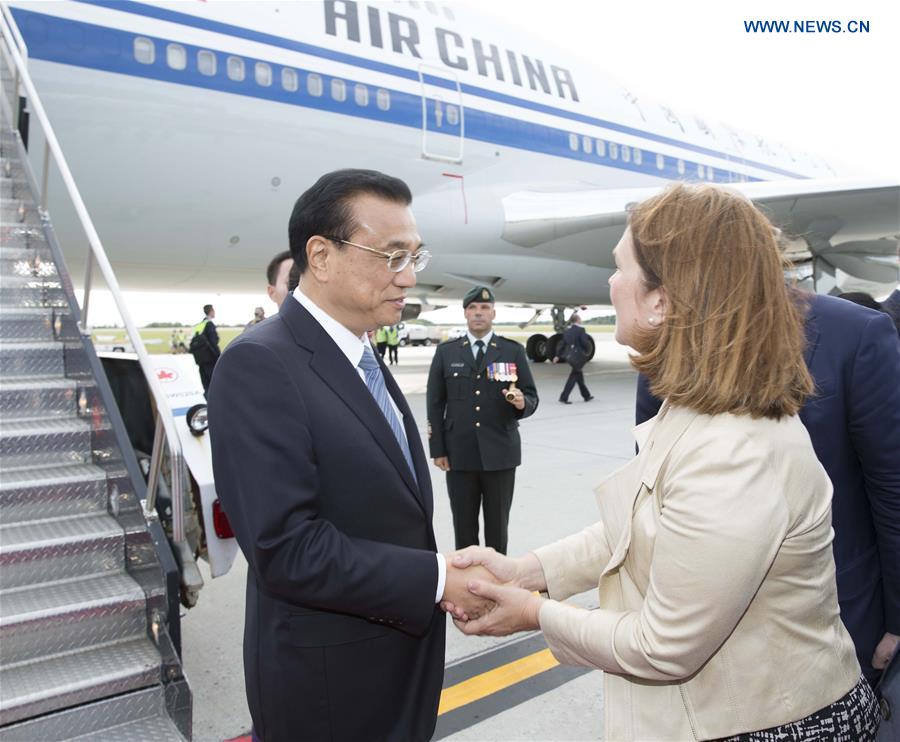Full coverage: Premier Li Attends UN Conferences, Visits Canada and Cuba
Full coverage: China’s Leaders
Chinese Premier Li Keqiang has arrived in Canada's capital, Ottawa. The city is the second of his three stops in the Americas this week. Li will meet with the country's Prime Minister Justin Trudeau at Parliament Hill on Thursday to discuss strengthening bilateral ties.

Chinese Premier Li Keqiang (L) and his wife Cheng Hong are welcomed by Canadian senior officials upon their arrival at Ottawa, Canada, Sept. 21, 2016. At the invitation of his Canadian counterpart Justin Trudeau, Chinese Premier Li Keqiang arrived here Wednesday for an official visit to Canada. (Xinhua/Huang Jingwen)
When they met less than three weeks ago in China, there was formality, fanfare, and friendliness. Back home, Canadian Prime Minister Justin Trudeau was being pressed to improve ties with the world's second biggest economy.
Geng Tan, from Trudeau's ruling Liberal Party, is the first Chinese-born member of the Canadian parliament.
He said, "Canada has fallen behind, in terms of trade, in terms of relations, in terms of import and export. And for the past ten years, we didn't do much to promote the bilateral relationship with China."
It was Trudeau's father, Pierre, nearly half a century ago, who - as then-Prime Minister - established ties with the PRC. Now, it is his son who must oversee what many are calling the Second Golden Era in cross-Pacific relations.
Earlier this month, Chinese and Canadian firms signed more than a billion dollars' worth of deals, covering everything from seafood to clean technology. Some argue: there's still room for much more.
"If you see continued demand of 6.5% - let's say, if that's the new growth path for China - that's still a very very strong opportunity for Canada," said Pedro Antunes, deputy chief economist of Conference Board of Canada.
"And I would argue that there's lots more that can be done, that we really haven't penetrated that market as well as we should have."
In the past, Chinese acquisitions in Canada have proved controversial, with many Canadians saying they were suspicious of China's interests. That thinking - some say - has now evolved.
Pedro also said, "I think we are opening up more and more and realizing that in fact some of these mergers and some of the acquisitions are essentially to look for opportunities in Canada where we've had success in some areas."
China has also been pushing for a bilateral free-trade agreement with Canada, something Ottawa has said it would be open to, in theory, but would take some time.
In China, Trudeau did announce Canada's intention to join the new Chinese-led Asian Infrastructure Investment Bank, the first North American country to do so. It was a move welcomed by Beijing as a step in the right direction.
Still, there is some distance between the two. A dispute, for example, on the export of Canadian canola seed - key for Canada's politically powerful Western provinces - remains unresolved putting two billion dollars in trade on the line.
Geng said, "I want to be the bridge. So whoever comes to ask me or consult with me, of course, I would be very happy."
"I tell them: do it. And Chinese people are normal people. They are not monsters. They want to do business with other people. And we should be able to create and build a strong relationship with them."















